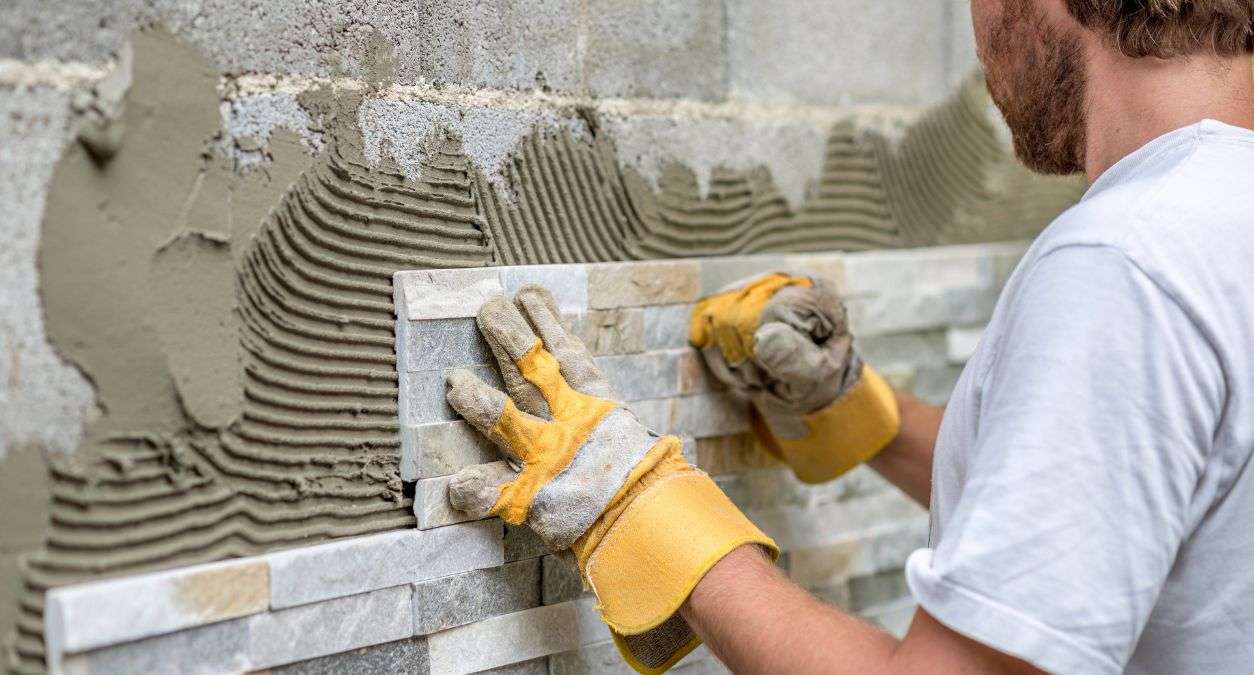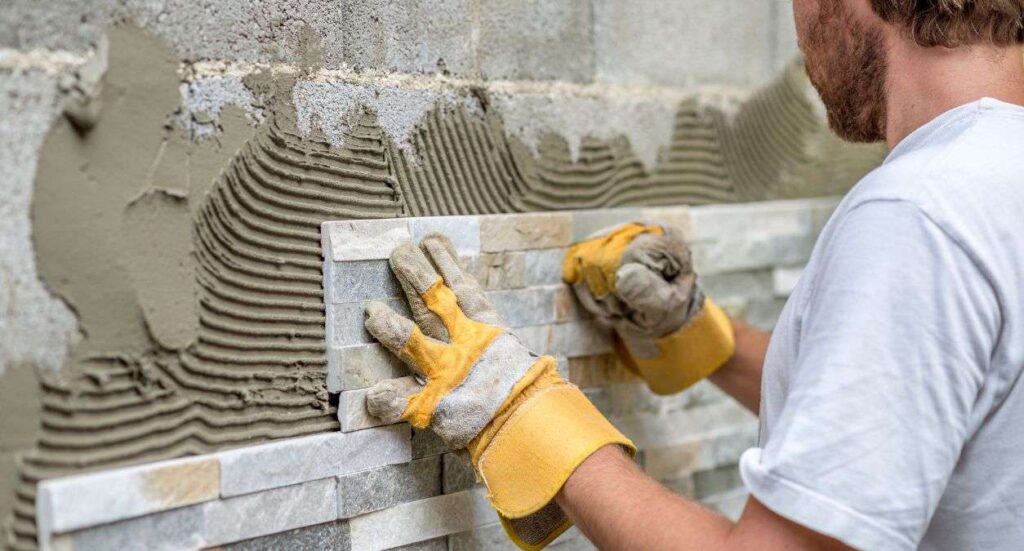Table of contents
Table of contents
Tiling is an essential trade within the construction industry, with demand across residential, commercial, and industrial projects. Whether laying tiles in a new kitchen, refurbishing a bathroom, or working on large-scale developments, tilers play a key role in creating functional and aesthetically pleasing spaces.
If you’re considering a career in tiling or wondering how much you can earn, we’ve summarised everything from average salaries to self-employment earnings, expenses, and ways to increase your income.
What do tilers offer clients?
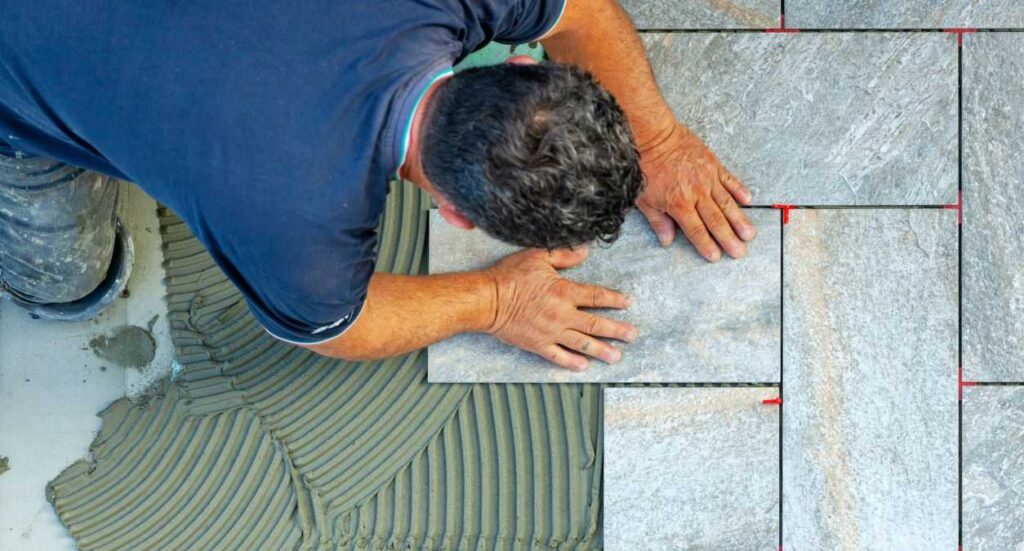
Tilers are responsible for installing tiles on walls, floors, and other surfaces using a range of materials, including ceramic, porcelain, natural stone, and mosaics. Their work involves precise measurements, surface preparation, adhesive application, and finishing techniques to ensure a professional and durable result.
Some tilers also specialise in complex designs, waterproofing, and heritage restoration. As tiling is required in homes, businesses, hotels, swimming pools, and more, skilled tilers often enjoy consistent demand for their services.
Are tilers in demand in the UK?
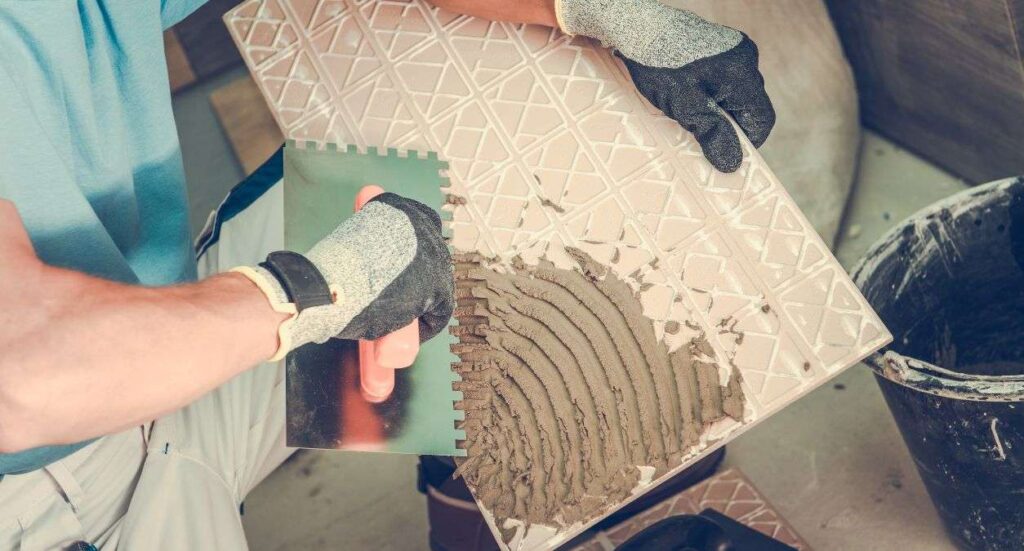
Yes, tilers are in steady demand across the UK, driven by ongoing growth in both the construction and home improvement sectors. From new-build housing developments to renovations, extensions, and commercial fitouts, tiling is a vital finishing trade that remains essential to many types of projects.
Homeowners continue to invest in bathroom and kitchen refurbishments—two areas where professional tiling is crucial for quality, waterproofing, and style. At the same time, developers and contractors require skilled tilers for large-scale residential and commercial projects, including hotels, restaurants, offices, and retail spaces.
There’s also a growing appetite for more complex and design-led tiling work, including large-format tiles, underfloor heating systems, and luxury finishes. This has created opportunities for skilled and experienced tilers to carve out niches and charge premium rates.
With a shortage of skilled tradespeople in some parts of the country, particularly in the Southeast and major urban centres, tilers with strong workmanship and reliability often find themselves with a steady stream of enquiries. The demand is especially high for those who can deliver both functional results and a high-end finish.
Typical career pathway for a tiler
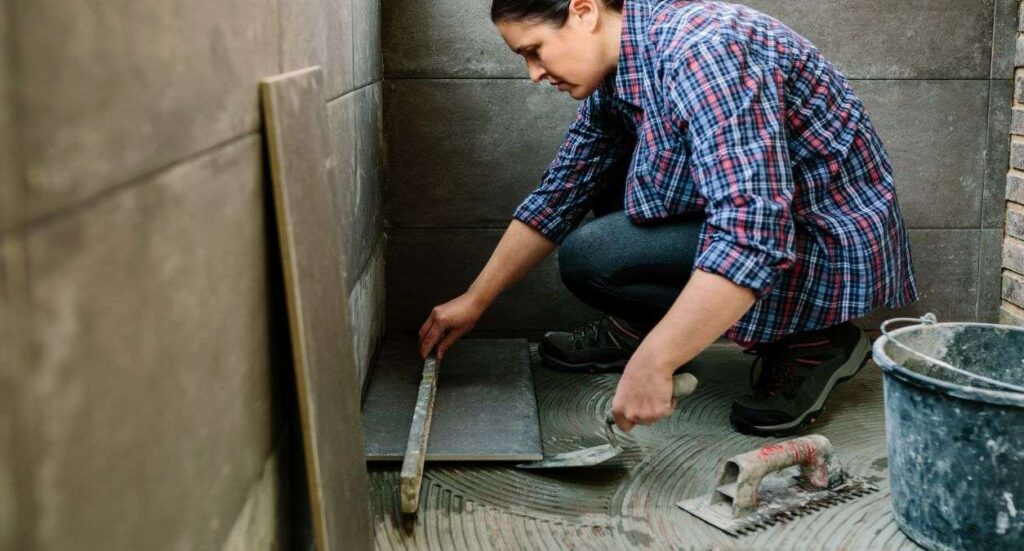
The journey to becoming a professional tiler usually follows a hands-on, skills-based route, often starting with formal training and progressing through practical experience. Here’s an outline of a typical career path:
1. Entry via Apprenticeship or College Course
Most tilers begin their careers through an apprenticeship or a college course in wall and floor tiling. These programmes teach essential skills such as surface preparation, tile cutting, adhesive use, and finishing techniques. Apprenticeships combine classroom learning with real-world experience, typically lasting 2–3 years.
- Relevant qualifications include:
- Level 2 or 3 Diploma in Wall and Floor Tiling
- NVQ (National Vocational Qualification) in Tiling
2. Junior or Assistant Tiler
After completing initial training, many tilers start as assistants, working under experienced professionals. This stage allows them to refine their skills, learn how to manage job sites, and gain confidence working independently.
3. Qualified Tiler
Once fully trained, tilers can work independently or as part of a team. They may be employed by building firms, contractors, or specialist tiling companies. At this stage, tilers can take on a wide range of residential and commercial projects and begin to build a portfolio of completed work.
4. Experienced or Specialist Tiler
With several years of experience, tilers often choose to specialise in high-end or technical areas such as:
- Natural stone or large-format tiles
- Wet rooms and underfloor heating
- Heritage tiling and restoration
- Commercial or industrial tiling
They may also pursue further qualifications or join trade associations like The Tile Association (TTA) to enhance credibility.
5. Self-employment or business ownership
Many tilers go on to become self-employed, setting up their own business or working as subcontractors. This offers greater control over projects, schedules, and income potential. Some eventually employ other tilers or apprentices, growing their business into a larger operation.
What is the average salary for a Tiler in the UK?
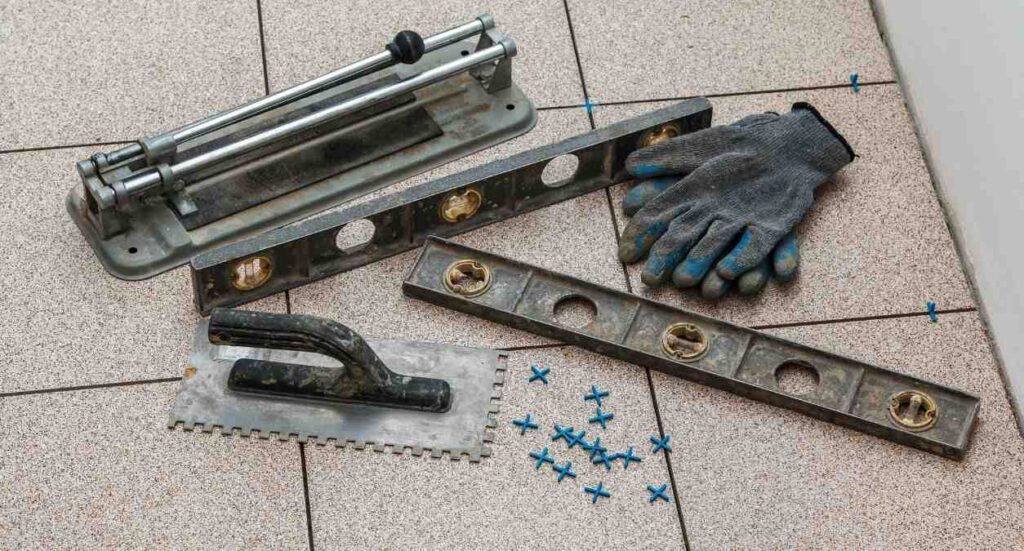
According to recent job market data, salaried tilers typically earn between £25,000 and £35,000 per year. Although, the average salary for a tiler in the UK does vary depending on experience, location, and employment type.
High-demand areas such as London and the Southeast, earnings can be higher. Self-employed tilers, who set their own rates, often have the potential to earn more, depending on the number of jobs they take on.
Average tilers’ salary at different experience levels
Entry-Level Tilers
Those starting out, often through apprenticeships, can expect to earn £18,000–£22,000 per year. Apprentices usually earn a lower wage initially, but earnings increase as skills develop.
An employer cannot pay you below the minimum wage, which, from April 2025, is £7.55 per hour for an apprentice and £12.21per hour for someone over 21 years.
Mid-Career Tilers
With a few years of experience, tilers can earn between £25,000 and £30,000 annually. At this stage, many professionals build a solid client base or move into specialist areas. You are also more likely to be developing more specialist skills that will help to increase your earning potential.
Experienced Tilers:
Those with 10+ years of experience, especially those running their own business or specialising in high-end projects, can earn £40,000+ per year, with some exceeding £50,000.
How much do self-employed tilers make?

Self-employed tilers have the potential to earn more than those in salaried positions, but their income depends on factors like workload, location, and business expenses. Many charge between £150–£250 per day, meaning annual earnings can range from £30,000 to £60,000+, depending on the number of jobs completed.
However, self-employment comes with additional responsibilities, such as sourcing work, managing finances, and covering business costs. These costs have to be taken into account when calculating earnings, although it’s useful to know expenses you can claim for as a tradesperson.
Costs and expenses for tilers
While self-employment can be lucrative, it’s important to factor in business expenses that affect overall profitability. These include both the ongoing costs of running a tiling business and the investment in maintaining or improving skills.
Tools and Equipment
Tilers need a range of essential tools, such as tile cutters, mixing drills, adhesive trowels, levelling systems, and protective gear. Replacing or upgrading tools over time is an additional cost to consider.
Transport and Fuel
Travelling to and from job sites can be a significant expense, especially for those covering large regions or working in rural areas.
Insurance
Public liability insurance is crucial to protect against accidents or damage while on site. Employers’ liability insurance may also be needed if hiring others.
Marketing and Business Costs
To stay competitive, self-employed tilers often invest in marketing, including a professional website, social media advertising, branding, and listing fees on lead-generation platforms like Checkatrade or Rated People.
Qualifications and Training
While many tilers begin with formal training, keeping skills up to date—or branching into specialisms—often involves ongoing costs. This might include advanced tiling courses, health and safety certifications (like CSCS cards), or learning new techniques and materials to meet market demand.
After covering these expenses, take-home earnings may be lower than headline rates suggest, particularly in the early stages of self-employment. Careful budgeting and reinvesting in tools and training can help tilers grow their business and income over time.
How to increase earnings as a Tiler
Tilers looking to maximise their income can consider the following strategies:
- Improve skills and gain certifications: Investing in advanced tiling courses or waterproofing certifications can lead to higher-paying jobs.
- Specialise in niche areas: Focusing on high-end tiling, underfloor heating installations, or large-format tiles can command premium rates.
- Build a strong reputation: Positive customer reviews and word-of-mouth recommendations can lead to consistent work.
- Utilise online platforms: Advertising on social media, Google My Business, or trade directories can attract new clients.
- Offer additional services: Providing related services like grout restoration, silicone sealing, or tile repair can boost income.
Which specialist tilers make the most?
Tilers who specialise in certain areas can often command higher fees. Some lucrative specialisms include:
- Luxury and large-format tiles: These require advanced skills and are often used in high-end properties.
- Wet rooms and waterproofing: A growing market, particularly in modern bathroom designs.
- Commercial and industrial tiling: Working on hotels, restaurants, and offices often brings larger contracts.
- Restoration and heritage tiling: Preserving and restoring historical properties can be highly rewarding and well-paid.
Other factors affecting earnings
Several external factors can influence how much a tiler earns:
Location: Tilers in cities like London often charge higher rates due to demand and living costs.
Economic conditions: The construction industry fluctuates, affecting job availability.
Seasonal demand: Some tilers find work slows down in winter, especially for outdoor projects.
Trade Associations & Networking: Joining professional organisations like The Tile Association (TTA) can lead to better opportunities and higher rates.
In summary
Tiling can be a rewarding career with good earning potential, particularly for those who develop specialised skills and consider self-employment. While salaries vary depending on experience and location, tilers who build a strong reputation, manage their expenses well, and focus on high-value projects can achieve a comfortable income. Whether you’re starting out or looking to boost your earnings, the key to success in tiling is a combination of skill, professionalism, and smart business strategies.
Get Tiler’s Insurance from Protectivity
*All rates listed are approximate, so it is suggested you do your research and consider what is most applicable to your own situation before setting prices.
*Disclaimer – This blog has been created as general information and should not be taken as advice. Make sure you have the correct level of insurance for your requirements and always review policy documentation. Information is factually accurate at the time of publishing but may have become out of date.
Last updated by




